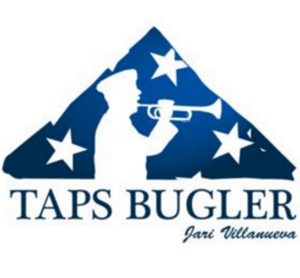
100 Nights of Taps Gettysburg 2019 starts Monday May 27 and continues every evening in the National Cemetery in Gettysburg with a live sounding of Taps at 7 PM
CLICK HERE FOR THE FACEBOOK PAGE
Taps at Gettysburg
What Taps means to me
by Jari Villanueva
On any weekday at cemeteries throughout the United States, a military ritual occurs that is both familiar and moving. An escort of honor comes to attention and presents arms. Next, a firing party fires three rifle volleys. After the briefest of moments, a bugler sounds the 24 notes of Taps, America’s most famous bugle call. The flag, held by members of the military honor guard, is then folded into a triangle reminiscent of the cocked hat from the American Revolution and then presented to the next of kin on behalf of the president and a grateful nation.
These military customs, many of which are rooted deeply and distantly in our past, have changed little over the years. The military honor guards, flag-draped caskets, the firing of three volleys, the sounding of Taps, and the folding of the flag are steeped in our history and the rendering of these honors is the ceremonial paying of respect and the final demonstration of the country’s gratitude to those who have faithfully served and defended our nation.
Of all the military bugle calls, none is so easily recognized or more apt to evoke emotion than Taps. The melody is both eloquent and haunting and the history of its origin is interesting and somewhat clouded in controversy and myth. The use of Taps is unique to the United States military, as the call is sounded at funerals, wreath-laying ceremonies and memorial services in addition to being performed as the final call of the day. Taps originally began as a signal to extinguish lights. The call was created by Union General Daniel Butterfield in July, 1862, while in camp at Harrison’s Landing, Virginia following the Seven Days’ battles during the Peninsular Campaign. With the help of brigade bugler, Oliver Willcox Norton, Butterfield replaced the regulation call for lights out (a call he felt too formal sounding to end the day) with the 24 notes we know today as Taps. For a more comprehensive history on this bugle call please visit www.TapsBugler.com.
It is fitting that Taps is sounded each evening during the summer at the Soldiers Monument in the National Cemetery at Gettysburg as part of the 100 Nights of Taps Gettysburg 2019 program as it remembers those who have served our nation and honors those in uniform today. 100 Nights is sponsored by TAPS FOR VETERANS, THE LINCOLN FELLOWSHIP OF PENNSYLVANIA, and THE NATIONAL PARK SERVICE
We are grateful to the volunteers buglers who sound Taps and the support team who ensure each evening’s sounding of Taps is performed with dignity and respect.
To many Americans Taps conveys an important message through its 24 notes. When sounded at night the call has given a sense of security and safety to Soldiers and also signaled that another day in the service to their country was done and all was well. Because of the melodious and poignant nature of the melody it is no wonder that it was adopted as the final call at funerals. As Gustav Kobbe stated in an 1898 Century article: “Played slowly and expressively, it has a tender, touching, mournful character, in keeping with the fact that it is sounded not only for ‘lights out,’ but also over the soldier’s grave, be he general or private, so that as with ‘lights out’ night closes in upon the soldier’s day, so with the same call the curtain rolls down upon his life.”
When I sound the call at a ceremony I’m sometimes approached by family members who wish to thank me for being part of the service. A reply of, “You are welcome,” has always seemed inappropriate or inadequate, so I say, “It is my honor.” I think Oliver Willcox Norton said it best: “There is something singularly beautiful and appropriate in the music of this wonderful call. Its strains are melancholy, yet full of rest and peace. Its echoes linger in the heart long after its tones have ceased to vibrate in the air.”
-Jari Villanueva served at Arlington National Cemetery for 23 years as an Air Force Bugler. A Nationally known bugle historian, he is a coordinator for 100 Nights of Taps Gettysburg 2017 and a board member of Taps For Veterans. His website is www.TapsBugler.com.











Well said! It is appropriate that as we approach Memorial Day we pause and remember the history of Memorial Day, and there is no better way than to reflect on the history of TAPS and what it means.